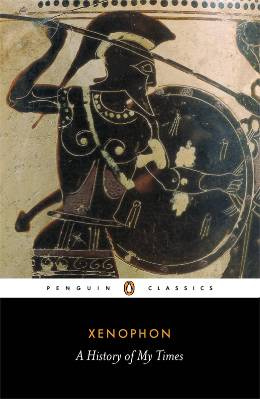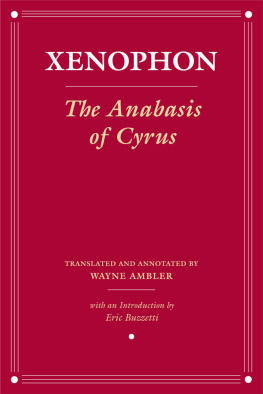Xenophon - Anabasis
Here you can read online Xenophon - Anabasis full text of the book (entire story) in english for free. Download pdf and epub, get meaning, cover and reviews about this ebook. year: 2012, genre: History. Description of the work, (preface) as well as reviews are available. Best literature library LitArk.com created for fans of good reading and offers a wide selection of genres:
Romance novel
Science fiction
Adventure
Detective
Science
History
Home and family
Prose
Art
Politics
Computer
Non-fiction
Religion
Business
Children
Humor
Choose a favorite category and find really read worthwhile books. Enjoy immersion in the world of imagination, feel the emotions of the characters or learn something new for yourself, make an fascinating discovery.
- Book:Anabasis
- Author:
- Genre:
- Year:2012
- Rating:4 / 5
- Favourites:Add to favourites
- Your mark:
- 80
- 1
- 2
- 3
- 4
- 5
Anabasis: summary, description and annotation
We offer to read an annotation, description, summary or preface (depends on what the author of the book "Anabasis" wrote himself). If you haven't found the necessary information about the book — write in the comments, we will try to find it.
Anabasis — read online for free the complete book (whole text) full work
Below is the text of the book, divided by pages. System saving the place of the last page read, allows you to conveniently read the book "Anabasis" online for free, without having to search again every time where you left off. Put a bookmark, and you can go to the page where you finished reading at any time.
Font size:
Interval:
Bookmark:
Rev. B. Jowett, M.A.
Master of Balliol College
Regius Professor of Greek in the University of Oxford
pupil of Socrates. He marched with the Spartans,
and was exiled from Athens. Sparta gave him land
and property in Scillus, where he lived for many
years before having to move once more, to settle
in Corinth. He died in 354 B.C.
The Anabasis is his story of the march to Persia
to aid Cyrus, who enlisted Greek help to try and
take the throne from Artaxerxes, and the ensuing
return of the Greeks, in which Xenophon played a
leading role. This occurred between 401 B.C. and
March 399 B.C.
CONTENTS
This was typed from Dakyns' series, "The Works of Xenophon," a four-volume set. The complete list of Xenophon's works (though there is doubt about some of these) is:
The Anabasis 7
The Hellenica 7
The Cyropaedia 8
The Memorabilia 4
The Symposium 1
The Economist 1
On Horsemanship 1
The Sportsman 1
The Cavalry General 1
The Apology 1
On Revenues 1
The Hiero 1
The Agesilaus 1
The Polity of the Athenians and the Lacedaemonians 2
Text in brackets "{}" is my transliteration of Greek text into English using an Oxford English Dictionary alphabet table. The diacritical marks have been lost.
Darius and Parysatis had two sons: the elder was named Artaxerxes, and the younger Cyrus. Now, as Darius lay sick and felt that the end of life drew near, he wished both his sons to be with him. The elder, as it chanced, was already there, but Cyrus he must needs send for from the province over which he had made him satrap, having appointed him general moreover of all the forces that muster in the plain of the Castolus. Thus Cyrus went up, taking with him Tissaphernes as his friend, and accompanied also by a body of Hellenes, three hundred heavy armed men, under the command of Xenias the Parrhasian (1).
Now when Darius was dead, and Artaxerxes was established in the kingdom, Tissaphernes brought slanderous accusations against Cyrus before his brother, the king, of harbouring designs against him. And Artaxerxes, listening to the words of Tissaphernes, laid hands upon Cyrus, desiring to put him to death; but his mother made intercession for him, and sent him back again in safety to his province. He then, having so escaped through peril and dishonour, fell to considering, not only how he might avoid ever again being in his brother's power, but how, if possible, he might become king in his stead. Parysatis, his mother, was his first resource; for she had more love for Cyrus than for Artaxerxes upon his throne. Moreover Cyrus's behaviour towards all who came to him from the king's court was such that, when he sent them away again, they were better friends to himself than to the king his brother. Nor did he neglect the barbarians in his own service; but trained them, at once to be capable as warriors and devoted adherents of himself. Lastly, he began collecting his Hellenic armament, but with the utmost secrecy, so that he might take the king as far as might be at unawares.
The manner in which he contrived the levying of the troops was as follows: First, he sent orders to the commandants of garrisons in the cities (so held by him), bidding them to get together as large a body of picked Peloponnesian troops as they severally were able, on the plea that Tissaphernes was plotting against their cities; and truly these cities of Ionia had originally belonged to Tissaphernes, being given to him by the king; but at this time, with the exception of Miletus, they had all revolted to Cyrus. In Miletus, Tissaphernes, having become aware of similar designs, had forestalled the conspirators by putting some to death and banishing the remainder. Cyrus, on his side, welcomed these fugitives, and having collected an army, laid siege to Miletus by sea and land, endeavouring to reinstate the exiles; and this gave him another pretext for collecting an armament. At the same time he sent to the king, and claimed, as being the king's brother, that these cities should be given to himself rather than that Tissaphernes should continue to govern them; and in furtherance of this end, the queen, his mother, co-operated with him, so that the king not only failed to see the design against himself, but concluded that Cyrus was spending his money on armaments in order to make war on Tissaphernes. Nor did it pain him greatly to see the two at war together, and the less so because Cyrus was careful to remit the tribute due to the king from the cities which belonged to Tissaphernes.
A third army was being collected for him in the Chersonese, over against Abydos, the origin of which was as follows: There was a Lacedaemonian exile, named Clearchus, with whom Cyrus had become associated. Cyrus admired the man, and made him a present of ten thousand darics (2). Clearchus took the gold, and with the money raised an army, and using the Chersonese as his base of operations, set to work to fight the Thracians north of the Hellespont, in the interests of the Hellenes, and with such happy result that the Hellespontine cities, of their own accord, were eager to contribute funds for the support of his troops. In this way, again, an armament was being secretly maintained for Cyrus.
Then there was the Thessalian Aristippus, Cyrus's friend (3), who, under pressure of the rival political party at home, had come to Cyrus and asked him for pay for two thousand mercenaries, to be continued for three months, which would enable him, he said, to gain the upper hand of his antagonists. Cyrus replied by presenting him with six months' pay for four thousand mercenariesonly stipulating that Aristippus should not come to terms with his antagonists without final consultation with himself. In this way he secured to himself the secret maintenance of a fourth armament.
of Plato, a native of Larisa, of the family of the Aleuadae, and a
pupil of Gorgias. He was also a lover of Menon, whom he appears to
have sent on this expedition instead of himself.
Further, he bade Proxenus, a Boeotian, who was another friend, get together as many men as possible, and join him in an expedition which he meditated against the Pisidians (4), who were causing annoyance to his territory. Similarly two other friends, Sophaenetus the Stymphalian (5), and Socrates the Achaean, had orders to get together as many men as possible and come to him, since he was on the point of opening a campaign, along with Milesian exiles, against Tissaphernes. These orders were duly carried out by the officers in question.
(5) Of Stymphalus in Arcadia.
But when the right moment seemed to him to have come, at which he should begin his march into the interior, the pretext which he put forward was his desire to expel the Pisidians utterly out of the country; and he began collecting both his Asiatic and his Hellenic armaments, avowedly against that people. From Sardis in each direction his orders sped: to Clearchus, to join him there with the whole of his army; to Aristippus, to come to terms with those at home, and to despatch to him the troops in his employ; to Xenias the Arcadian, who was acting as general-in-chief of the foreign troops in the cities, to present himself with all the men available, excepting only those who were actually needed to garrison the citadels. He next summoned the troops at present engaged in the siege of Miletus, and called upon the exiles to follow him on his intended expedition, promising them that if he were successful in his object, he would not pause until he had reinstated them in their native city. To this invitation they hearkened gladly; they believed in him; and with their arms they presented themselves at Sardis. So, too, Xenias arrived at Sardis with the contingent from the cities, four thousand hoplites; Proxenus, also, with fifteen hundred hoplites and five hundred light-armed troops; Sophaenetus the Stymphalian, with one thousand hoplites; Socrates the Achaean, with five hundred hoplites; while the Megarion Pasion came with three hundred hoplites and three hundred peltasts (1). This latter officer, as well as Socrates, belonged to the force engaged against Miletus. These all joined him at Sardis.
Font size:
Interval:
Bookmark:
Similar books «Anabasis»
Look at similar books to Anabasis. We have selected literature similar in name and meaning in the hope of providing readers with more options to find new, interesting, not yet read works.
Discussion, reviews of the book Anabasis and just readers' own opinions. Leave your comments, write what you think about the work, its meaning or the main characters. Specify what exactly you liked and what you didn't like, and why you think so.














